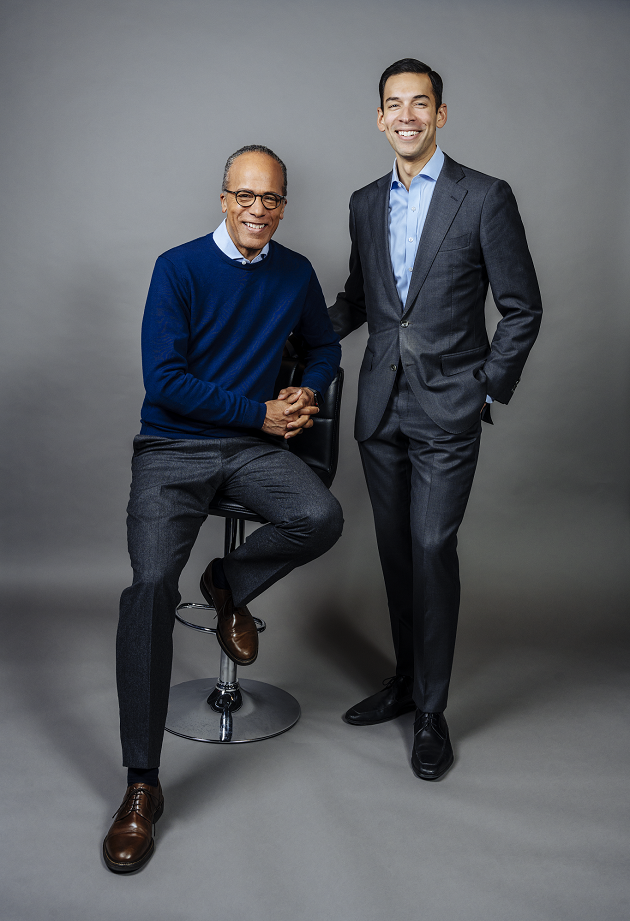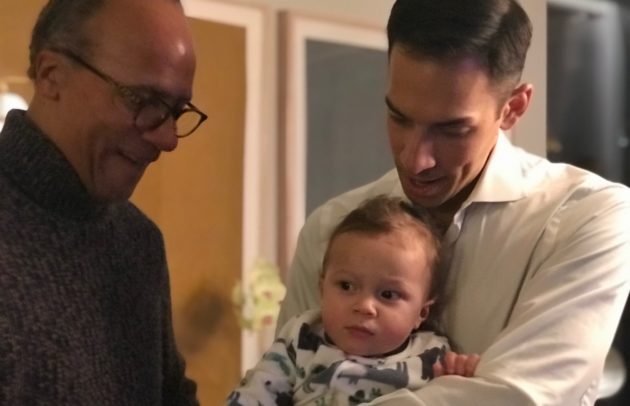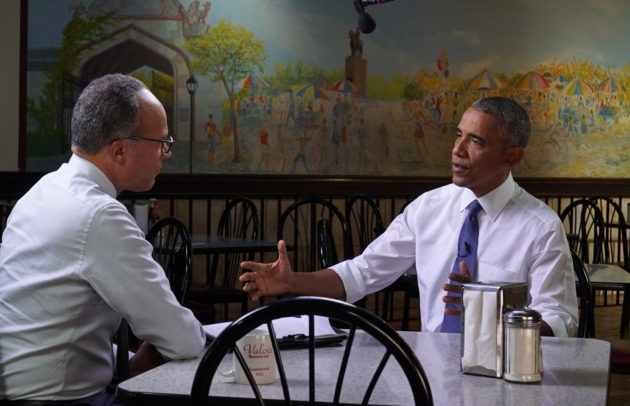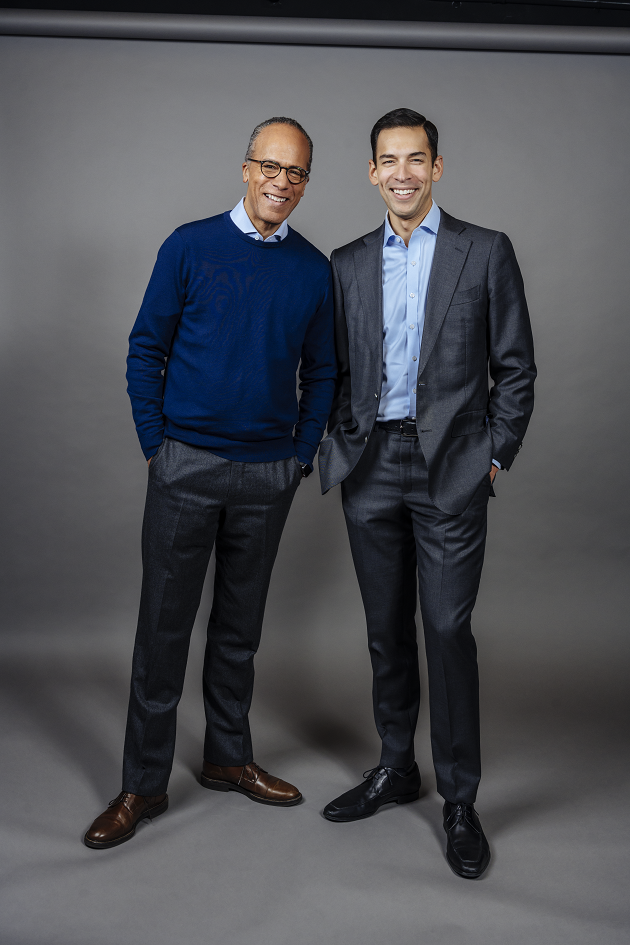
No news is too small for the Holt family. When they get a whiff of activity, Lester Holt and his son Stefan Holt leap into action.
Both currently anchors for NBC—Lester for “Dateline” and “Nightly News,” and Stefan for WNBC—they recounted rushing from a family gathering toward sirens in the Flatiron District two years ago (Lester says that just by listening to the number of sirens, he could tell something big was happening). That night, the Serbian Orthodox Cathedral of St. Sava was on fire; on the spot, Lester and Stefan started taking video and reporting. It wasn’t the sort of story national news was going to cover, but the self-proclaimed “news nerds” didn’t mind: They saw a story and felt the urge to share. Though this specific event was recent, Stefan has long loved the journalism world his father inhabits.
“When I was a kid, I had the news bug too,” Stefan, 31, says. “[When] Dad was running out on a story or we heard sirens, I wanted to tag along.”
Though Stefan pursued a political science degree at Pepperdine University before beginning his reporting career, Lester notes that he always showed an interest in current events (Lester explained the Gulf War to him in kid-friendly terms when he was roughly 3 years old).
“So many mornings he would get up at 4:30am with me and come down to Studio 1A on a Saturday—what teenager does that, I don’t know, but he did,” Lester recalls. “He got to know the crews, he hung out, got to understand a little bit about how we put a broadcast on the air.”
The two have even co-anchored together: Once, when Lester was visiting Stefan in Chicago for Thanksgiving, he learned his son was anchoring his broadcast alone. After chatting with NBC, Lester got the go-ahead to join him on screen.
Lester’s illustrious reporting career—prefaced by time as a disc jockey at a Country and Western station and radio reporter—began its TV leg in 1981: He started as a reporter for WCBS-TV New York and moved to Los Angeles to be a reporter and weekend anchor for KCBS-TV (at the time, called KNXT); by 2000, he found a home on MSNBC, with stints on “Weekend TODAY,” “NBC News,” and a host of other programs. He’s been with NBC ever since. As a group of journalists, Lester, Stefan, and I decide not to do the math of how long he’s been a TV reporter: After all, Lester says, that’s what Siri’s for. His body of work has ranged from national reportage to on-site journalism—he takes his show on the road whenever he can (when he’s not making cameos on shows and movies like “30 Rock” and “The Fugitive,” or playing bass with his rock band, the Rough Cuts, that is).

“One of the things I taught Stefan, and he gets, is that while we’re anchors, we’re reporters first: That is the highest calling in what we do, is being a reporter,” Lester says. He claims he used to be a “dispassionate” anchor because he thought “that’s what newsmen are: They’re dispassionate, they cover the news, there’s no tears, no feelings.” But all that changed when he became a father to Stefan and his younger brother Cameron, 29, and he realized it’s “not an editorial position to be sad.”
“On a few occasions I’ve shed tears on stories or been obviously moved emotionally, and that’s not an editorial position,” Lester says. “We’re not talking about politics here or business policy or foreign policy; [they’re] human stories.”
Specifically, Lester remembers choking up on-screen as he learned about the casualties of the Sandy Hook shooting in December 2012. “I remember the emotion kind of swept over me, and my voice caught, and I had a moment,” Lester says. “I hate to always say you have to have kids to feel that, because I think that’s an insult to people that don’t have kids—I think we’re all capable of these feelings—but I think certainly being a father, emotions come on very quickly.”
Stefan’s a father as well: His wife Morgan, whom he met at Pepperdine and married in July 2012, recently gave birth to 1-year-old Henry, and so he agrees that having a child changed his perspective as a reporter. That in mind, he and Lester extol empathy as essential in an anchorman.
“It’s hard not to be touched by what happens in the world, by tragedy, by heartbreak, by some of the tough subject matter that we cover, and I know in my particular case, being a new dad, I’ve felt that sting of a heartbreaking story a little bit more than I think I used to,” Stefan says. “It’s important to realize that there are those human emotions and human feelings when we do cover these sorts of stories, and if anything, that empathy helps us become better storytellers. I think that’s something I learned from [my Dad], just knowing how hard it is sometimes to cover difficult subject matter.”
He adds that ever since he had his son, he’s found that when he interviews other parents, he “can connect and relate to them a little bit more than [he] used to.”
While it may be difficult, Lester says, a large part of covering subject matter is putting yourself in the interviewee’s shoes.
“I project: ‘How would I deal with this if this was me: If this was my family, if that was my house lying in shambles, if that was my kid in a school that’s on lockdown’ and try to process,” Lester says. “It makes you a more empathetic reporter, and thus, a better reporter, to make sure that you can put yourself in those situations and understand where people are coming from.”
Lester thinks we’re living in a post-shock environment, and that’s what rattles him about our era; news of shootings like the Columbine High School shooting [in April 1999], which used to dominate weeks of coverage, now pass in three days. Some of that, he concedes, is due to the accessibility and speed technology allows in research, interviewing, and news-gathering.

“Now, that’s not an indictment of what we do, it’s kind of just where we are that a lot of the shock value now of things that used to hold our attention for a long time for whatever reason has been diminished, and as someone who has been in the business for a long time, I remember Columbine: That story dominated for weeks. The Vegas massacre [in October 2017], I covered that— within a few days, that story was slipping below the headlines. And a part of that is that we—and I’m going to use the broader term ‘media’—were just so good, and there were just so many of us covering these stories right now that sometimes stories that might’ve been the day two or the day three story can be told in the first day because of our ability to quickly research and verify and the amount of information we have coming,” Lester says. “It’s not a commentary on us or any particular person, but it’s just a reality that we’re in this position now that people hear something like that and you’re sad and you’re moved, but part of you almost comes to acknowledge that it’s now part of the environment we live in.”
Good journalism is not just about being empathetic—Lester emphasizes that, with his notoriety, he has access to people the public might not (after all, he both moderated the first 2016 presidential debate and interviewed President Trump one-on-one in May 2017). His goal is to be a stand-in for the audience at home, both asking what they want to know and approaching questions from an outside viewpoint.
“I try as I’m asking questions, whatever the story may be, to always put the viewer in my head and be their representative,” Lester says. “When I’m anchoring, I try to picture representing the viewers. One of the reasons that I like to take our broadcast on the road when something big is happening, rather than me be on the set… I think it’s important that we get out there, and as the anchor, my presence can sometimes put a stamp on it that says this is a story that we’re going to cover in a big way. It also allows me to leverage my notoriety sometimes to get interviews that I might not otherwise get or get access I might not otherwise get.”
But although he has more access than others, he’s not comfortable with the concept of being put on a “news altar,” which is likely why his reportage is so congenial. It serves to his benefit—a friendly, relatable voice rings trustworthy and sincere. It’s apparent that sincerity is not solely an on-screen persona for either as Lester and Stefan riff off each other’s stories, filling in gaps and cracking jokes around the table during our interview.
[gravityform id=”13″ title=”false” description=”false” ajax=”true”]
“I consider myself such a lucky guy to have a great mentor [in my Dad], to have grown up and observed everything about this industry from an early age,” Stefan says. “[Now, I also] have a great mentor as a dad—on how to be a dad and how to be a father—and I definitely learn from my dad’s example as we raise Henry.”
Lester, ever-supportive, shares that usually while writing promos and other materials midday, he’ll turn on WNBC to check out Stefan’s broadcast. Stefan recently shot the tree-lighting ceremony, and walked off-screen to a text from Lester, giving (positive!) notes on the broadcast.
“I’m incredibly proud of Stefan. He has really done a good job of earning his own way—it’s not always easy being attached to a name of someone who’s got a lot of notoriety, but he’s really navigated it well,” Lester says. “I wanted to make sure he had his space. He’s been here a while now, and we never obviously deny [our relationship], and it’s a healthy relationship, but we don’t look at it as a gimmick. I’ve had a very successful career, he’s on his way to an amazing career as well, and we’re supportive of each other.”
Lester’s equally proud of son Cameron, who works in finance—at one point, Cameron thought he might be a reporter too, but after a summer internship at CNBC, told his dad that journalists “work too hard.” “He’s not the extrovert that Stefan is, but he’s a little bit of a deep thinker; listening to him is just fascinating sometimes, his take on news. He’ll say something and I’m like: ‘Wow, yeah, we should put you on as a guest on MSNBC,’” Lester laughs. “He’s very keen and an astute observer.”

The family often “talks shop” when they get together, or focus attention on little Henry, asking for baby advice—“Is this normal?” is a common question—or simply playing with the family’s new addition. Sometimes, though, Stefan and Lester talk about another shared passion: Aviation (“We’re both airplane nerds,” Stefan says—apparently, they’re nerds for anything they like). Their family has an extensive background in the skies, from former Air Force members to Lester’s wife—and Stefan and Cameron’s mom—Carol Hagen-Holt, who was a flight attendant. Stefan himself is a licensed pilot.
When they fly together, Stefan says Lester is his copilot.
“God’s your copilot,” Lester responds with a laugh.
They’ll often grab dinner together too: As is the nature of news, Stefan’s constantly checking his watch to make sure he has time before he goes on-screen—the exact same time-gauging motion Lester used to make when he would meet the kids for family dinners back when they were young and he reported in Chicago. And as is the nature of news, either could be called away at a moment’s notice. With the media landscape changing so rapidly, it’s essential to be ready for whatever news may break.
“I think the future belongs to those [news organizations] who are constantly peeking around the corner,” Lester says. Stefan agrees, and says he’s glad they’re both experiencing the new era in journalism together.
“What we realize is that people aren’t abandoning news, they’re in other places right now. If you don’t catch me on the nightly news, you’ll catch me on the web later, maybe you’ll catch me on your taxi, on the airline—we’re constantly trying to figure out: ‘Where’s the next place they’re going to go?’ I tell people, ‘I might be in your wallpaper someday,’” Lester laughs. “What’s important is that my job doesn’t change. We still cover news.”
To catch Lester and Stefan Holt on NBC, visit nbc.com!












